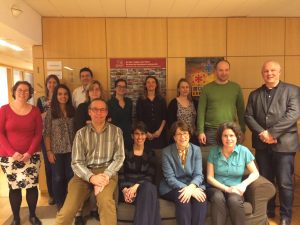On 9 and 10 March 2016, the University of Wolverhampton’s Brussels office hosted the first partner meeting of the MinD project, led by Prof Kristina Niedderer of the Faculty of Arts. Researchers from 10 partner organisations in five European countries came together to discuss how they will collaborate in the area of designing for the mindful self-empowerment and social engagement of people with dementia.
The partner organisations are a combination of universities, healthcare providers and design professionals. During this four-year project, which will run until February 2020, they will work together to design and create a number of experiential prototypes to support people with dementia. These will cover designing to help with personal difficulties with social engagement, and designing the environment to help with social engagement.
The project will be carried out through a series of 15-day exchanges in the partner countries: the UK, Germany, the Netherlands, Luxemburg, Spain and Australia. Researchers will be hosted by one of the partners as they work on issues such as data collection, design development, implementation and testing of the designs. The first exchanges will take place in May 2016 and will be hosted by partners in the Midlands, UK.
Prof Kristina Niedderer, project coordinator, said “The meeting was an excellent first opportunity for all partners to come together and to plan for the implementation of this novel project. Bringing together design and mindfulness to support dementia care offers new and exciting research opportunities, which this consortium will explore. The MinD project is one of the few that uses design to foreground the human experience when interacting with technology.”

